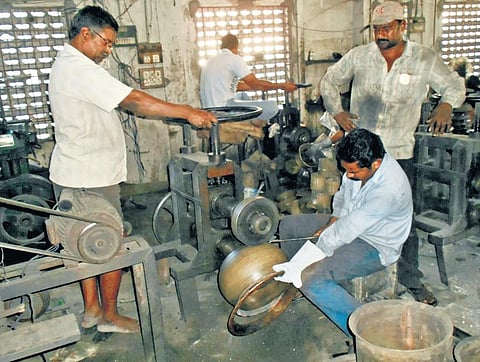

RAJAMAHENDRAVARAM: Ever wondered where and how a bell in temples across the State is manufactured? To know how, one should have to visit Ajjaram, a village in Peravali mandal of East Godavari district, which is known for its unique brassware and bronzeware handicrafts.
Surrounded by Vasista river, a tributary of Godavari river, and paddy fields, Ajjaram, which is around 40 km away from Rajamahendravaram, is the hub for brass and bronze items not only used in religious shrines across both Telugu states, but also used in some churches in the United States.
Brassware industry of Ajjaram has gained national reputation for the elegance and exquisite beauty of its decorative articles. With the dawn of independence, the industry remarkably progressed and is presently placed second among other Indian handicraft industries.
Being a labour-intensive industry, it had vast promises to provide employment to thousands of people.
Recently, the brassware industry at Ajjaram has also emerged as a prominent place in South India in the brass industry. The brasswares are so popular that veteran director K Raghavendra Rao, used hundreds of brass pots in the song ‘Velluvachi Godaramma’ from the movie ‘Devatha’, which brought enormous fame to Ajjaram.
A long time ago, people were reluctant to marry their daughters to Ajjaram grooms, fearing that their daughters would get involved and forced to manufacture brassware. However, this tiny village has proved it wrong and become one of the most renowned places to rely on brass and bronze needs.
With a little over 2,700 population, as many as 2,500 are into manufacturing brass items, making it a livelihood for generations. This is perhaps one of the very few vocations not limited to a particular caste. Ranging from 50 grams to 500 kg, earlier people used to make the items manually, which they learned from their elders.
Later, with the development of technology and increase in demand, machines replaced labour bringing an enormous change in the lives of people. This has brought a change in the attitude of the people, where they are no more hesitant to join their children in schools. However, the elders are expressing apprehension that the unique ancient handicraft would shrink over a period of time.
Those engaged in the craft say making an item mechanically doesn’t happen here. The design, making and finishing reveal the sense and degree of involvement. Notably, none in the profession complain of poor living standards. They are content with their lives and feel recognised when the customers appreciate their work.
However, people of this region, who are in the business for the last three decades, said that there has been a decline in demand and the number of workers has come down, said B Satyalingam, a brass industry owner.